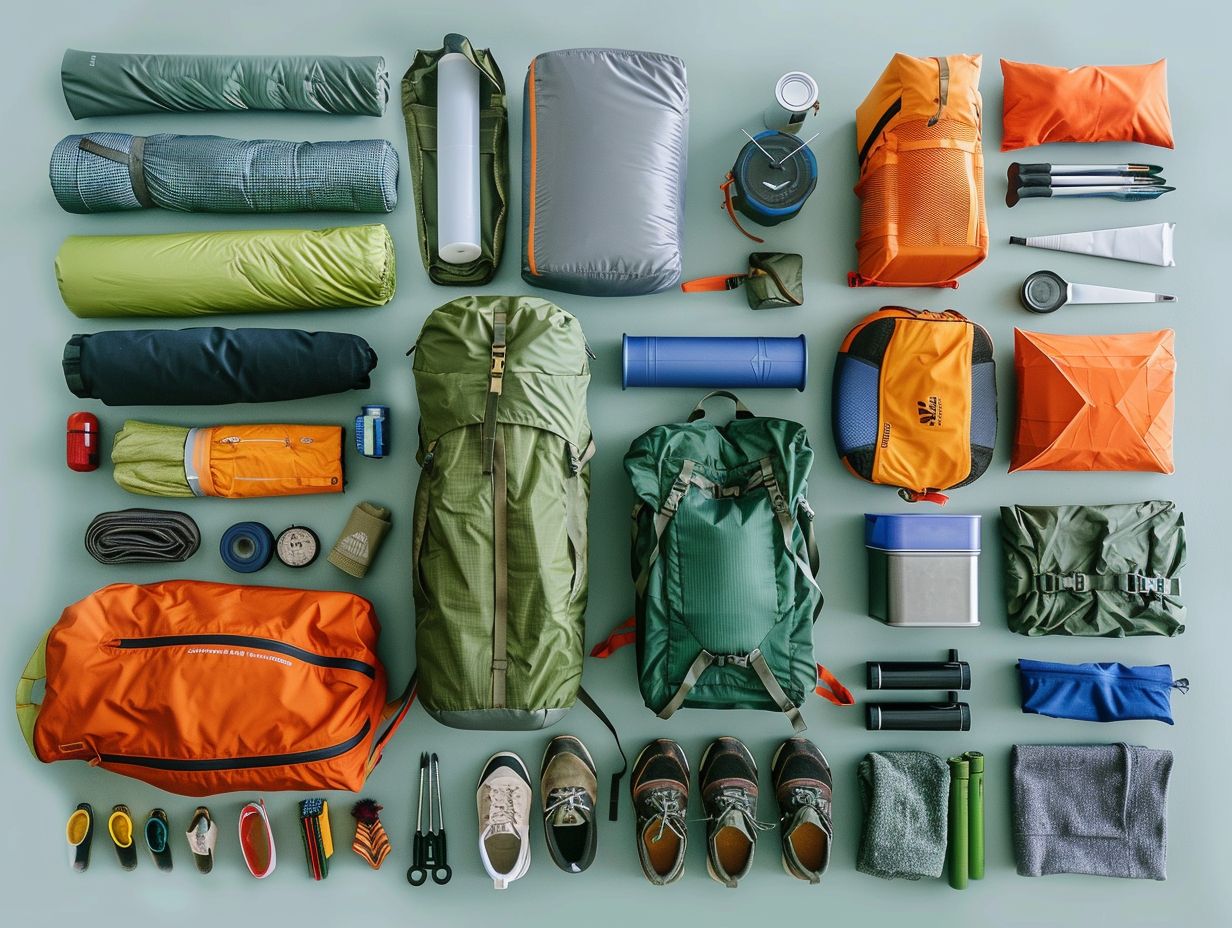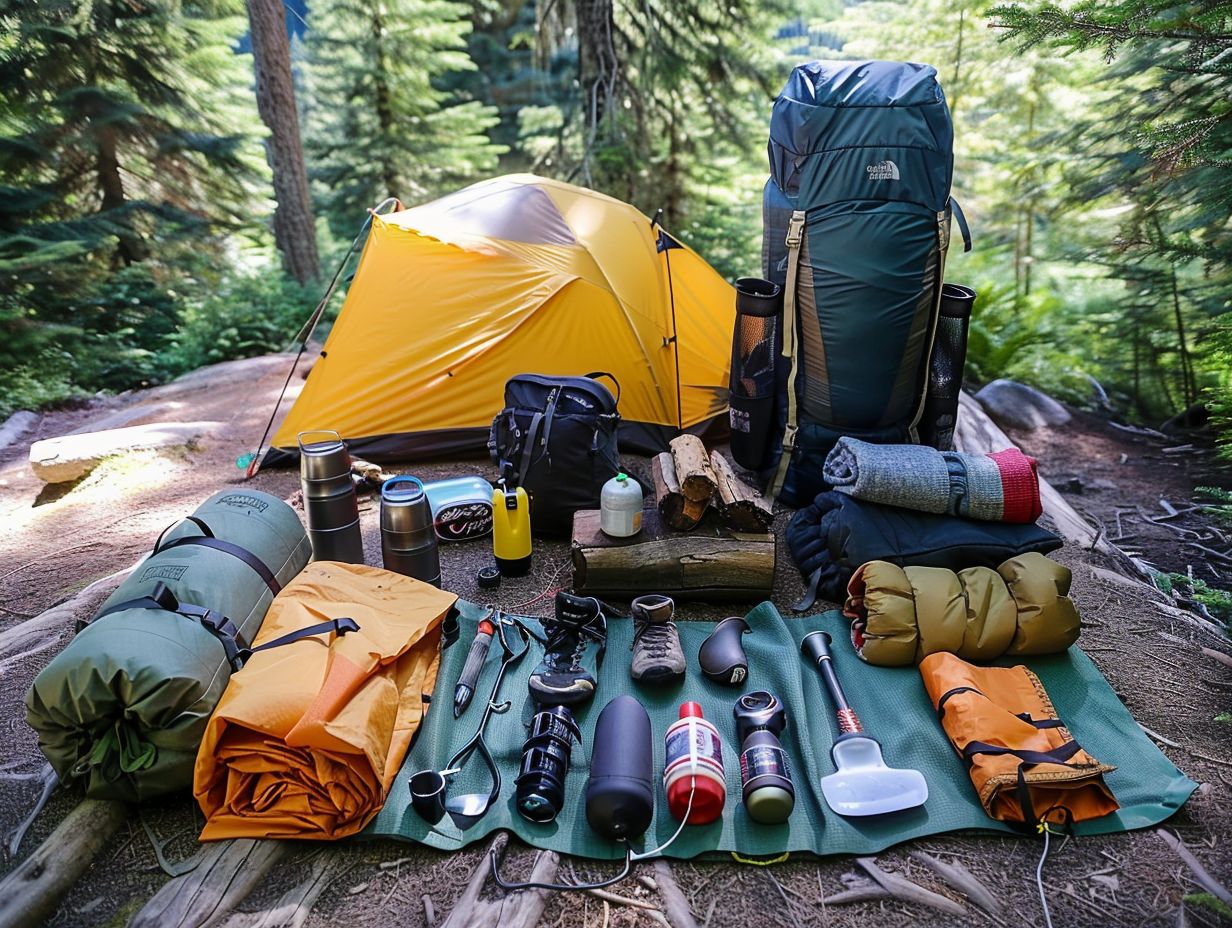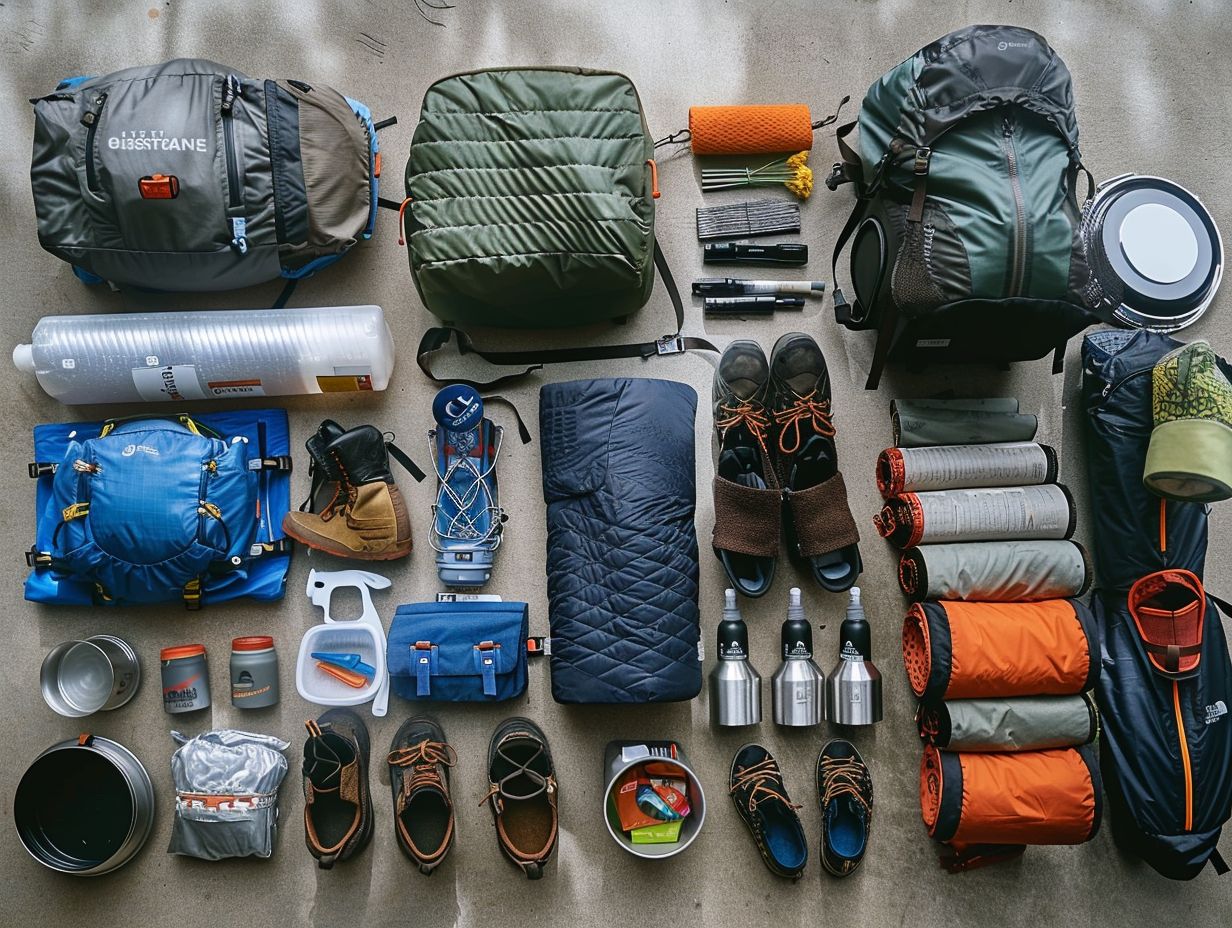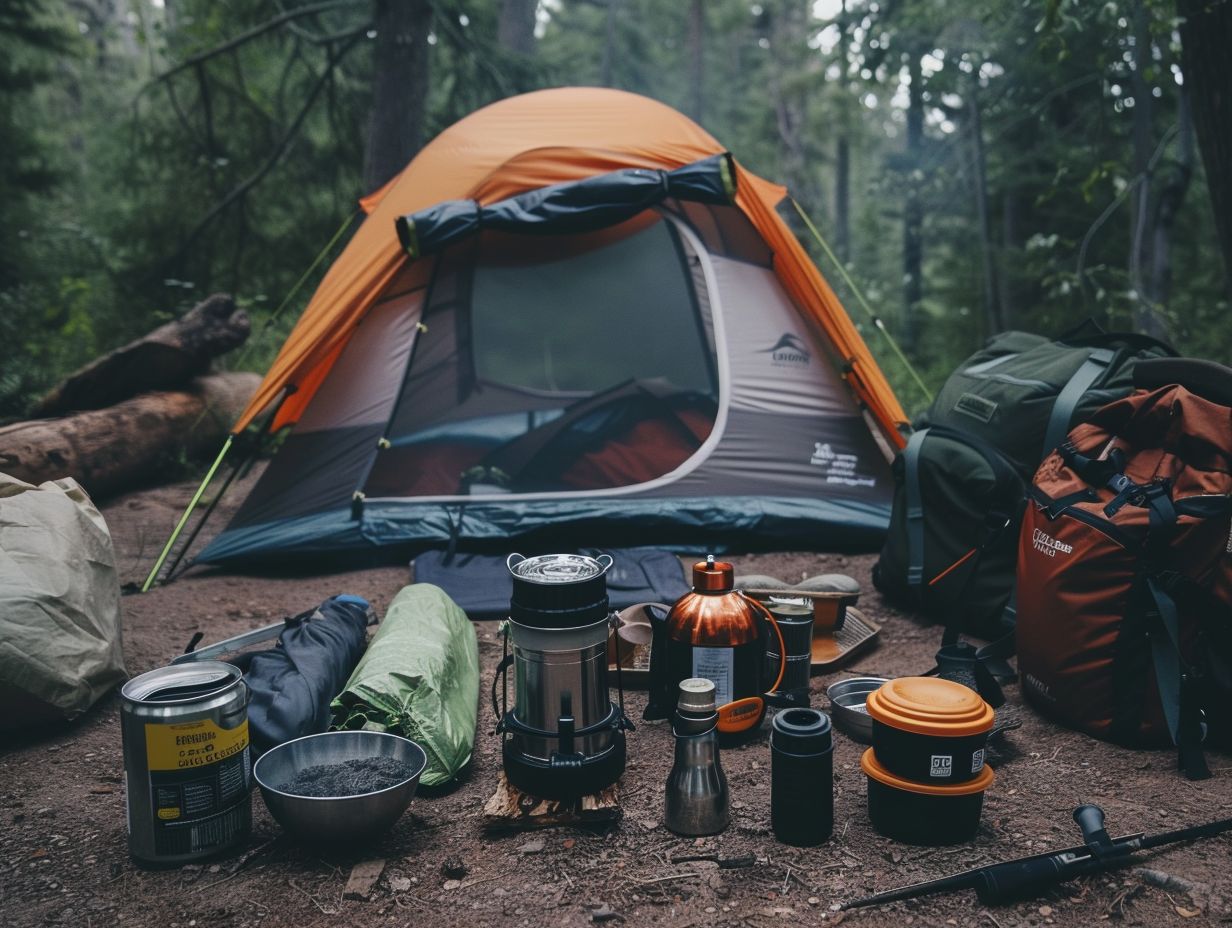When planning a camping trip, ensure you are fully prepared by following a pre-camping checklist to avoid common mistakes. This checklist covers everything from selecting the appropriate campsite to packing essential gear. Be sure to check the weather forecast, properly store food, and adhere to Leave No Trace principles.
Learn the proper procedures for setting up camp, staying safe during emergencies, and ensuring an enjoyable and relaxing camping experience. Prepare for your adventure by utilising expert tips and advice.
Key Takeaways:

- Always check the weather forecast before heading out on a camping trip to avoid being caught in inclement weather.
- Make a pre-camping checklist to ensure you have all essential gear, including appropriate clothing, footwear, and lighting.
- It is important to inform others of your camping plans and location in case of emergencies or unexpected situations.
1. Choosing the Wrong Campsite
When selecting the ideal campsite, it is essential to consider several factors for a successful outdoor adventure. A key consideration is to avoid crowded areas and prioritize safety to lay the foundation for a memorable camping experience.
Proximity to water sources should be a crucial factor in your campsite selection process. Access to clean water for drinking, cooking, and washing is essential for your comfort and well-being during the trip.
Additionally, opting for a campsite with level ground can greatly facilitate the pitching of tents and setting up camp, ensuring a more convenient and comfortable experience.
Furthermore, take into account the natural beauty surrounding the campsite when making your decision. The aesthetic appeal of the area can significantly enhance your overall enjoyment and relaxation during the trip, offering a picturesque backdrop for outdoor activities and moments of tranquillity in nature.
2. Not Checking the Weather Forecast
When planning a camping trip, it is crucial for you to check the weather forecast in advance. This will allow you to anticipate and prepare for any potential challenges that may arise, ensuring a safe and enjoyable outdoor experience.
After reviewing the forecast, it is important to keep in mind that weather conditions can shift rapidly in outdoor environments. To be well-prepared for sudden changes in temperature, consider layering your clothing.
Opt for lightweight, moisture-wicking base layers that can be easily adjusted by adding or removing layers as needed based on the weather conditions.
Additionally, it is advisable to pack a waterproof outer layer to keep dry in the event of rain. Remaining informed about weather updates throughout your trip is essential. Stay vigilant by utilising weather apps on your phone or a portable weather radio to monitor any fluctuations in conditions while camping.
3. Forgetting Essential Gear
Having the right gear and equipment is essential for a successful camping trip. From tents to cooking tools, ensuring you have all the necessary gear can greatly impact your outdoor experience.
A high-quality sleeping bag is vital for a comfortable night’s rest in the great outdoors. It offers warmth and insulation against the cold night air, ensuring you wake up rejuvenated and prepared for the day ahead.
A well-equipped first aid kit is a necessity for any outdoor excursion. It can assist in treating minor injuries and provide crucial medical supplies in case of emergencies.
Navigation tools like a map, compass, or GPS device are essential for staying on course and avoiding getting lost in unfamiliar surroundings.
4. Not Packing Enough Food and Water
When you’re getting ready for a camping trip, it’s crucial to pack an adequate supply of food and water to maintain your energy levels and stay hydrated. Ensuring you have enough food and water is essential to the success of your outdoor adventure.
As you plan your meals for your camping excursion, opt for easy-to-prepare and non-perishable options such as tinned goods, dehydrated meals, and energy bars. Choose foods that are rich in protein and complex carbohydrates to sustain your energy levels throughout the day.
Divide your food into portions for each meal to guarantee you have sufficient supplies for the entire trip. When storing your food, utilise airtight containers or sealable bags to prevent spoilage and deter pests.
Consider investing in a portable water filter or water purification tablets to ensure you have a dependable source of clean water for your outdoor activities.
5. Not Bringing Appropriate Clothing and Footwear
Choosing the right clothing and footwear for camping is essential for staying comfortable and protected in outdoor environments. From layering clothing to selecting durable footwear, proper attire can enhance your camping experience.
In terms of camping, layering clothing is crucial for adapting to changing temperatures. Begin with a moisture-wicking base layer to keep sweat away from your body, then add insulating layers for warmth, and finally, complete the ensemble with a waterproof and wind-resistant outer shell.
For footwear, it is important to choose sturdy hiking boots for challenging terrains and breathable trail shoes for easier trails. Matching your footwear to the type of terrain you will be exploring is essential for a comfortable and safe camping experience.
By paying attention to these details and making informed choices regarding your clothing and footwear, you can ensure that your camping adventure is both comfortable and safe.
6. Not Having a Backup Plan
Having a backup plan is essential for handling unexpected situations and ensuring a seamless camping adventure. It is important to be prepared for changes in weather, campsite availability, or equipment malfunctions as they can greatly impact your trip.
If there is unexpected road closures, having alternate routes planned can be highly advantageous. These alternate pathways can help you reach your destination despite any unforeseen obstacles.
Emergency contacts are crucial to have on hand in case of injuries or emergencies. Knowing that help is just a phone call away provides a sense of security and peace of mind during your camping trip.
Carrying extra supplies such as food, water, and first aid kits can be a game-changer in unforeseen circumstances. For instance, having spare tent pegs available can prevent a night of discomfort if some are lost or broken during setup. Being proactive and prepared for any potential challenges can make a significant difference in the overall success of your camping experience.
7. Not Informing Others of Your Whereabouts
Informing others of your camping trip details and whereabouts is a safety measure that ensures assistance can reach you in case of emergencies. Sharing your itinerary and contact information with trusted individuals is a responsible camping practice.
This proactive approach not only provides you with a sense of security but also allows those back home to have peace of mind regarding your well-being. Clearly outlining your expected return times and locations will aid rescuers in locating you swiftly if needed.
Establishing communication protocols, such as setting regular check-in times using satellite phones or emergency beacons, can facilitate staying in touch while exploring remote areas where ordinary phone signals may not reach.
8. Not Setting Up Camp Correctly

Properly setting up your camp is crucial for ensuring a safe and enjoyable outdoor adventure. From securely pitching your tents to efficiently organizing your camp areas, the correct camp setup plays a significant role in facilitating a hassle-free camping experience.
In terms of assembling your tent, it is essential to begin by identifying a flat and level terrain to establish your shelter. Lay out the tent footprint to outline the boundaries of your sleeping space. Assemble the poles and incrementally raise the tent, ensuring that all corners are securely staked down.
Campfire safety is of utmost importance; establish a designated fire pit at a distance from flammable objects and always keep a bucket of water nearby for precautionary measures. Proper waste disposal is essential, so use designated rubbish bags and dispose of them in the appropriate manner.
To elevate your camping experience, you may want to consider setting up a separate cooking area from your sleeping quarters, creating a comfortable sitting area with camp chairs around a fire, and organizing your gear in easily accessible containers. By following these simple guidelines, you can create a functional and pleasant campsite layout.
9. Not Properly Storing Food
Properly storing food at the campsite is essential for preventing the attraction of wildlife and ensuring food safety. Avoiding the common mistake of leaving food unattended is crucial in maintaining a clean and secure camping environment.
Utilising bear-proof containers or hanging food from trees are effective strategies for keeping food out of reach from curious animals. When food is left exposed, it not only poses a threat to wildlife but also heightens the risk of dangerous encounters between animals and campers.
Properly cleaning up meal remnants and disposing of rubbish further reduces the likelihood of wildlife approaching the campsite in search of food.
10. Not Following Leave No Trace Principles
Adhering to Leave No Trace principles is essential for minimising environmental impact and preserving natural spaces during camping trips. By following these principles, you ensure that future generations can also enjoy the beauty of the outdoors.
Respecting wildlife is a crucial aspect of Leave No Trace principles. You can achieve this by observing animals from a distance, refraining from feeding them, and avoiding making loud noises that could disturb their habitats.
Minimising campfire impact involves using established fire rings if available, keeping fires small, and completely extinguishing them before leaving.
Leaving no waste behind means packing out all rubbish, composting food scraps, and following specific guidelines for human waste disposal to keep the environment clean and undisturbed.
11. Not Knowing Basic First Aid
Having knowledge of basic first aid is essential for you as a camper to handle common emergencies and injuries in outdoor settings. Being prepared with first aid skills can make a significant difference in the outcome of camping incidents.
One crucial aspect of first aid for camping is proper wound care. This includes cleaning wounds with antiseptic wipes, applying plasters, and monitoring for signs of infection. Knowing CPR can be a lifesaving skill in case of cardiac emergencies.
Treating burns promptly by cooling the affected area with water and covering it with a sterile dressing is vital. Insect bites can also be common in outdoor environments, so having antihistamines and creams for relief is recommended. Assembling a comprehensive first aid kit with these essential items is crucial for your outdoor adventure.
12. Not Being Prepared for Emergencies
Preparedness for emergencies is a critical aspect of any camping adventure. Anticipating potential risks, having emergency plans, and carrying essential supplies can ensure you are ready to handle unexpected situations.
In a wilderness setting, injuries can occur from activities like hiking or setting up camp. It is wise to have a well-stocked first aid kit and know basic first aid techniques.
Monitoring weather reports and being aware of changing conditions can help you prepare for severe weather events. Having a reliable communication device, such as a satellite phone or a personal locator beacon, can be a lifesaver in case of getting lost or separated from the group.
Establishing emergency contacts and discussing emergency protocols with fellow campers can also provide a sense of security.
13. Not Bringing Enough Lighting
Proper lighting is essential for a safe and enjoyable camping trip, especially during the evening when visibility is limited. By avoiding inadequate lighting, you can improve the visibility, security, and overall satisfaction of your campsite.
When considering lighting options for your camping adventure, headlamps offer versatility by providing hands-free light as you navigate the outdoors.
Lanterns are ideal for creating a cosy ambiance at the campsite, whether you are preparing a meal or engaging in recreational activities. It is important to strategically place lights around the campsite to illuminate key areas such as near the tent entrance, cooking area, and pathways to facilities.
Adhering to campfire safety protocols is critical to prevent accidents and ensure a secure camping environment.
14. Not Knowing Campground Rules and Regulations
To have a harmonious camping experience, it is crucial for you to understand and adhere to campsite rules and regulations. By following site-specific guidelines, you demonstrate respect for nature, fellow campers, and park regulations.
Typically, common campsite rules include respecting designated quiet hours to maintain a peaceful environment for all visitors, properly disposing of waste to minimise harm to the ecosystem, and following wildlife interaction protocols to ensure the safety of both campers and animals.
By abiding by these rules, you play a role in preserving the campsite for the enjoyment of future visitors, helping to maintain the natural beauty and tranquility of the surroundings.
15. Not Having Fun and Relaxing
Engaging in enjoyable activities and taking time to relax are essential components of a fulfilling camping experience. Embracing fun moments and relaxation amidst nature can make camping trips truly memorable.
When you explore nearby hiking trails, you not only connect with the great outdoors but also get some exercise while camping. Stargazing under the clear night sky can be a mesmerising experience. It allows you to marvel at the beauty of the universe above.
Gathering around a crackling campfire to share stories, laughter, and s’mores can create a sense of camaraderie and warmth, fostering connections with fellow campers and creating lasting memories.
Disconnecting from technology during these activities can help you truly disconnect from the hustle and bustle of everyday life. It allows you to fully immerse yourself in the peaceful serenity of the natural world.
What Are the Essential Items to Bring on a Camping Trip?

Preparing for a camping trip involves gathering essential items that contribute to your comfort, safety, and convenience in outdoor settings. Packing the right gear, equipment, and supplies is crucial for a successful and enjoyable camping experience.
One of the most essential items for camping is a reliable tent, providing you with shelter and protection from the elements. A good-quality tent should be durable, easy to set up, and spacious enough to accommodate all campers. Pairing the tent with a suitable sleeping bag ensures you get a restful night’s sleep, especially in chilly nights.
Cooking equipment such as a portable stove or grill is necessary for preparing meals, while a well-stocked first aid kit can be a lifesaver in emergencies. Each item plays a vital role in enhancing your camping adventures and preparing you for unexpected situations.
What Are the Dos and Don’ts of Choosing a Campsite?
When selecting the right campsite, you should follow a series of dos and don’ts to ensure an optimal outdoor experience. Understanding what to prioritise and what to avoid is key to a successful camping trip.
One crucial factor to consider when choosing a campsite is the proximity to water sources. Access to clean water for drinking, cooking, and cleaning is essential. Opt for level ground to make setting up your tent and sleeping more comfortable. Look for natural shelter, such as trees or rock formations, to provide added protection from the elements.
Conversely, common mistakes to avoid include selecting low-lying areas prone to flooding, setting up camp near potential hazards like unstable cliffs or dead trees, and choosing crowded sites that may compromise your privacy and tranquillity.
How Can One Prepare for Inclement Weather While Camping?
Preparing for adverse weather conditions is essential for a camping trip to effectively manage sudden changes in temperature, precipitation, or storms. Equipping yourself with the appropriate gear and knowledge can ensure safety and comfort during adverse weather situations.
Start by ensuring you have essential rain gear, such as a waterproof jacket, trousers, and boots, to stay dry in wet conditions. Layering with thermal clothing underneath can help retain body heat in the event of cold weather.
Properly secure your tent with pegs and guy ropes to prevent it from being carried away by strong winds. Monitor weather forecasts closely using a reliable source, such as a weather app or a portable radio, to stay informed about any unexpected changes. Be prepared to adjust your camping plans as necessary, always prioritising safety above all else.
What Are the Most Commonly Forgotten Items on a Camping Trip?
Despite your careful planning, you may sometimes overlook certain essential items on a camping trip, which can lead to inconvenience or potential risks. Identifying the most commonly forgotten items can help ensure that you are well-prepared for your outdoor adventure.
Some of these overlooked essentials include matches for lighting fires, toiletries for personal hygiene, insect repellent to ward off pesky insects, and navigation tools such as maps or a compass. To prevent these oversights, it is recommended that you create a checklist before packing to ensure that you have all the necessary items.
Consider packing matches in a waterproof container, opting for travel-sized toiletries to save space, choosing an insect repellent with DEET for effectiveness, and practising the use of navigation tools before the trip. These simple tips can significantly enhance your camping experience.
What Are the Best Clothing and Footwear Choices for Camping?
When preparing for camping trips, it is crucial to select appropriate clothing and footwear that will ensure your comfort, protection, and mobility. By choosing the right materials and styles, you can enhance your outdoor experience and effectively adapt to changing weather conditions.
To optimise your comfort and regulate your body temperature, consider layering your clothing. This not only provides insulation but also allows you to adjust to temperature fluctuations throughout the day.
Utilising moisture-wicking fabrics, such as merino wool or synthetic blends, can help keep you dry and comfortable by drawing sweat away from your skin. Additionally, investing in waterproof footwear is essential to prevent discomfort and potential blisters, especially when hiking through wet or muddy terrain.
When packing for camping adventures, prioritise versatile items like convertible trousers, multi-functional jackets, and quick-drying tops. These pieces can be easily layered to accommodate different conditions, providing you with the flexibility and protection needed for a successful outdoor experience.
What Are Some Alternative Plans If the Campsite Is Not Ideal?
Having contingency plans in place for unforeseen campsite conditions or unavailability is crucial for adapting to changing situations during a camping trip. Exploring alternative options can save time and ensure a successful outdoor experience.
Consider researching nearby campsites that may offer last-minute availability or different facilities that could suit your requirements. Having a list of day trip options to nearby hiking paths, lakes, or picturesque viewpoints can provide a contingency plan for a change of scene.
Participating in various outdoor activities such as angling, birdwatching, or nature photography can also offer a revitalising alternative if the original camping spot does not meet your expectations.
Why Is It Important to Inform Others of Your Camping Plans?
It is crucial for you to share your camping plans with trusted individuals to ensure safety and coordination in the event of emergencies or unexpected situations. Informing others about your location enhances communication and emergency response capabilities during outdoor adventures.
Plus sharing your planned camping location, it is essential to provide details such as the expected duration of your trip, any specific activities you have planned, and a list of emergency contacts.
By leaving a comprehensive itinerary that includes contact information, route specifics, and estimated return times, you enable your loved ones to stay informed and prepared. This information not only cultivates a sense of security but also allows for timely assistance if necessary.
Regular check-ins and updates with your designated contacts can further improve safety and provide peace of mind for all parties involved.
What Are the Steps for Properly Setting Up Camp?
Efficiently setting up your campsite involves a series of steps to establish a functional and comfortable outdoor living space. By following a structured approach, you can ensure that you enjoy a hassle-free camping experience as soon as you arrive.
- Set up the tent:
- Find a flat, dry spot and lay out the tent footprint to protect the floor.
- Assemble the poles according to the tent instructions and insert them into the corresponding eyelets.
- Once the tent is up, secure it with pegs and adjust the guy ropes for stability.
- Prepare the campfire area:
- Clear any debris and create a safe distance from the tent.
- Organise your camping equipment:
- Strategically place your camping equipment to optimise space.
- Ensure items are easily accessible when needed.
How Can Food Be Properly Stored to Avoid Attracting Wildlife?

Proper food storage techniques are essential for preventing wildlife from being attracted to your campsite and maintaining a safe camping environment. Safely storing food can help minimise the risks associated with animal encounters and promote responsible camping practices.
When camping in bear country, it is highly recommended that you use bear-proof containers to securely store your food and prevent curious critters from gaining access. Another effective method to deter animals from reaching your provisions is to hang food bags from tree branches away from your campsite.
Always ensure that you dispose of food scraps and leftovers properly in designated rubbish receptacles to eliminate any lingering scents that could attract wildlife to your location.
Failing to adhere to these precautions can pose a danger to both humans and animals, as well as disrupt the natural foraging behaviour of local wildlife.
What Are Some Basic First Aid Skills Every Camper Should Know?
Campers must possess basic first aid skills to effectively manage common injuries and medical emergencies encountered in outdoor settings. These skills are crucial in enabling individuals to deliver prompt assistance and ensure the safety of themselves and others during camping trips.
It is important to have the knowledge of how to correctly clean and dress a wound to prevent infections and facilitate healing, especially in remote wilderness areas.
For example, consider a scenario where you are hiking and someone sustains a cut on their knee from a fall. By properly disinfecting the wound and applying a sterile dressing, you can reduce the risks of complications.
Having a thorough understanding of CPR techniques is essential for dealing with cardiac emergencies. Engaging in practice scenarios, such as simulating a cardiac arrest, can boost campers’ confidence in administering CPR effectively when the need arises.
Frequently Asked Questions
What is a pre-camping checklist and why is it important?
A pre-camping checklist is a list of essential items and tasks that you should go through before heading out for a camping trip. It helps ensure that you have everything you need and can avoid common mistakes that could potentially ruin your trip.
What are some common mistakes people make when going camping?
Some common mistakes include forgetting essential items, not checking the weather forecast, not properly setting up the tent, and not bringing enough food and water.
What items should be included in a pre-camping checklist?
Your pre-camping checklist should include items such as a tent, sleeping bags, cooking equipment, first aid kit, bug spray, and any other necessary gear for your specific trip.
How far in advance should I start working on my pre-camping checklist?
It is recommended to start working on your pre-camping checklist at least a week before your planned trip. This will give you enough time to gather any necessary items and make any necessary preparations.
What are some tips for avoiding common mistakes when setting up a campsite?
Some tips include arriving at the campsite early, carefully choosing a level and dry spot for your tent, properly securing your tent with stakes, and keeping food and other scented items away from your tent to avoid attracting animals.
What should I do if I realise I forgot something on my pre-camping checklist?
If you realise you forgot something on your pre-camping checklist, do not panic. Try to find a solution, such as borrowing the item from a fellow camper or purchasing it at a nearby store. If it is a crucial item, consider whether it is worth cutting your trip short to go back and retrieve it.



